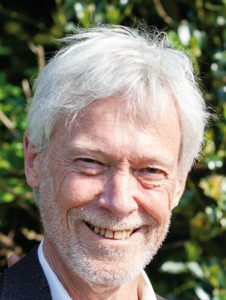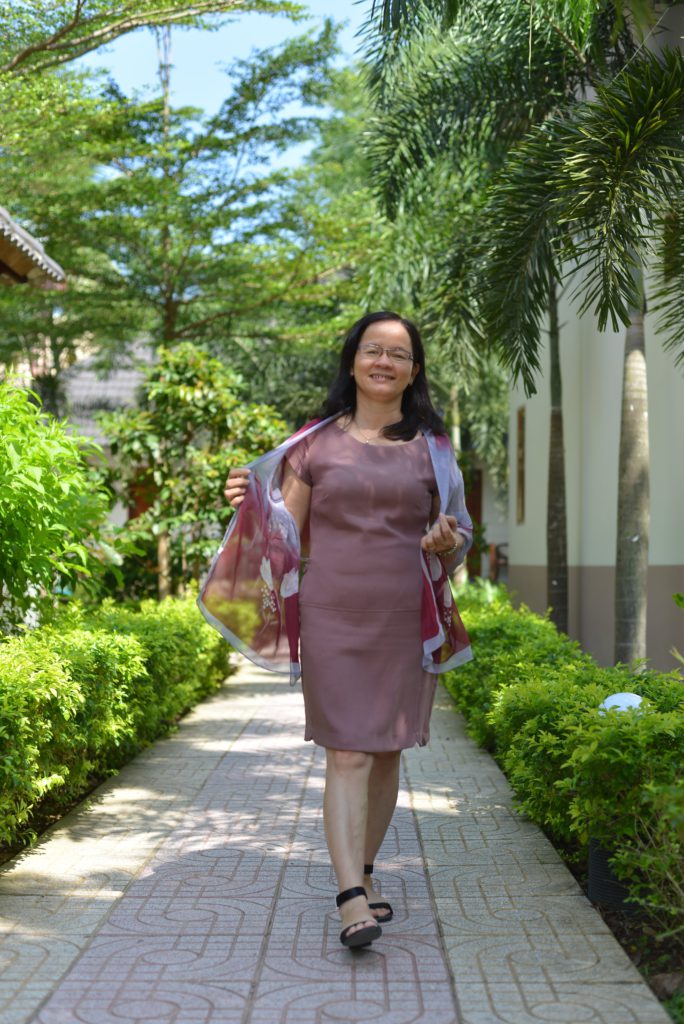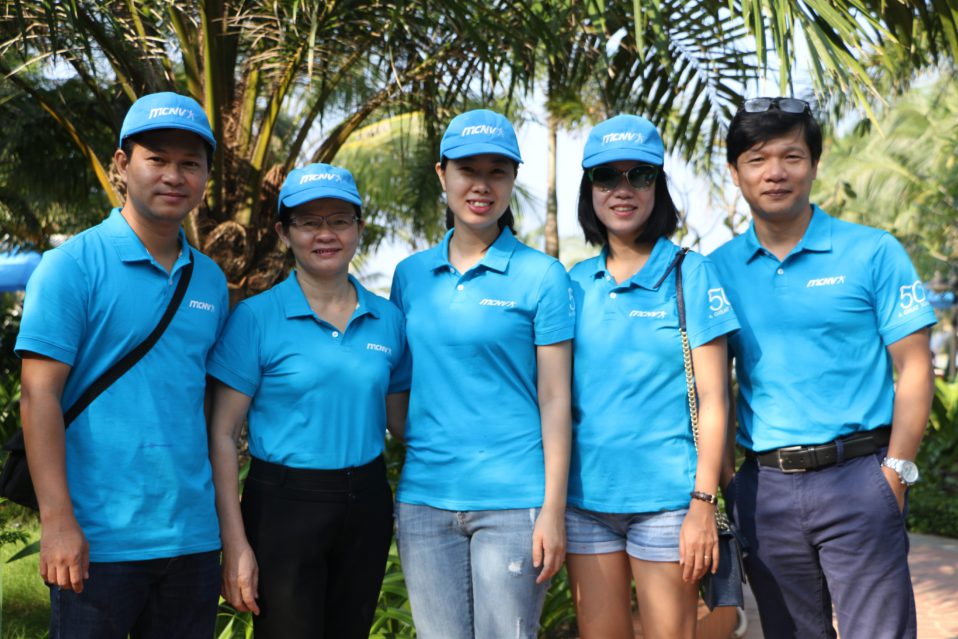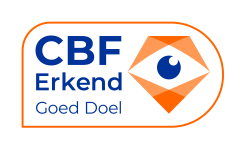MCNV has been working with this partner to build the capacity of the organisation and increase the skills of health care professionals.
Provincial Health Department – Lao
The main role of this organisation is to oversee the health care of all the communities in the province. MCNV has built a strong relationship with the Provincial Health Department in Savannakhet since 2008.
Women’s Union – Vietnam
The Vietnam Women’s Union is one of the most important partners in MCNV development programs in Vietnam, at all levels.
Women’s Union – Lao
The Lao Women’s Union is a close partner of MCNV, helping to promote gender equality throughout the whole district.
Local NGOs and CBOs – Vietnam
In Vietnam, MCNV also actively cooperates with local non-governmental organisations (NGOs) and community-based organisations (CBOs).
Local Authorities – Vietnam
The official partner in MCNV’s CMHLD program in Khanh Vinh district, Khanh Hoa province, is the District People’s Committee.
Biogas in the memory of a donor
Tom Fluitsma is an MCNV donor and has been an active volunteer from 1999 onwards, as an editor of MCNV Magazine and as a tour leader of donor travels. He has often traveled in Vietnam, with and without donors. This year he writes columns about special memories of the times he was there.

Mr. Tom Fluitsma, MCNV’s donor
Biogas
November 1999. My first visit to Vietnam. Of course, we also visit the Mekong Delta for a few days. Our travel guide takes us to tourist sights. Sometimes he adds a small surprise to our program. For example, we visit a small farming village in the delta. We walk into the yard of a family and are warmly welcomed in their wooden house. There are a few large pigs in a pen next to the house. We exchange some courtesies and the guide translates: ‘You are welcome in our house. Take some of the fruit on the table’, ‘Thank you so much, kind of you to receive us’. In the meantime, I can’t keep my eyes off a giant plastic bag hanging under the roof of the house.
Pigs. In the Netherlands we like pork chops or bacon. We keep a lot of pigs for that, about 12.5 million. The manure of all these pigs is useful in agriculture, but it also produces a lot of greenhouse gases. We can hardly use that with global warming going on. No surprise, therefore, that this topic gets attention in the draft climate agreement. One of the many documents associated with this agreement contains the following proposal: ‘Processing and valorization of all fresh pig manure in closed regional clusters into green energy, substitutes for fossil fertilizer and valuable fertilizers’.
Biogas. In Vietnam there are 4 million pig farmers. There are differences between Vietnam and the Netherlands, but one thing is the same: Vietnamese pigs also produce manure and that manure also produces a lot of greenhouse gases. In November 2018, an interesting article was published in our NRC newspaper about a study into the extent to which countries succeed in offering their population a good standard of living, without exceeding ecological limits. Vietnam does relatively well in that study. Nice detail: almost 10% of pig farmers have a biogas installation. The article reminds me of my visit to Vietnam in 1999.
Back to the Mekong Delta, November 1999. I’m still looking at that giant plastic bag hanging under the roof. Our guide notices. That was exactly his intention, he didn’t take us to this family for nothing. He no longer leaves me in suspense: “This farmer has a few pigs. He collects the manure in the sealed container that you see there. He leads the biogases that are released upwards into the big bag in that thick plastic hose. At the back of the bag a black tube goes to the gas burner in the kitchen. This is how this family cooks, on free gas’. A special place of interest, off the beaten tourist paths. That was in 1999. Now, twenty years later, there are 350.000 pig farmers in Vietnam with an installation like that. As far as I know, Vietnam does not have a climate agreement, but the pig farmers there are well on their way to ‘processing and upgrading all fresh pig manure in closed region clusters into green energy’.
“We now think differently about disabled people”
Ngoc Lan, staff member of MCNV for 20 years
“We now think differently about disabled people”
As soon as we meet each other in the lobby of the hotel in Dong Ha, Nguyen Ngoc Lan spreads her arms and walks towards me with a smile. A cordial and inviting gesture that, according to all of MCNV colleagues, is characteristic of Ngoc Lan. She is a doctor, worked as a project manager at MCNV in Quang Tri for almost 20 years and left the organization at the end of 2018. While enjoying a cool glass of fruit juice I ask her to look back on the many projects in which she participated. Does she see improvements in the lives of the people she has supported?

Ms. Ngoc Lan, staff member of MCNV for 20 years
Compared to the past I certainly see improvements in the lives of the disabled,” says Ngoc Lan. “Soon after I started at MCNV in 1999, I went to see a poor family with four disabled children. Try to imagine that, four seriously ill children in one family, who received no help or support whatsoever. Imagine the struggle of the parents to improve the situation. After the World Health Organization (WHO) issued a guideline on the inclusion of disabled people, MCNV, together with partners, devised a comprehensive approach to tackle the problems of disabled people. Good results have emerged from this.
” Having a disability, getting married was once unthinkable”
People with disabilities were dicriminated in the past, but when they stood up and started working, they got respect from the people around them. For the first time their lives moved upwards instead of spiraling downwards. People with disabilities who are getting married, for example, this was previously unthinkable in Vietnam. Most disabled people can now develop better physically because they can use guidance and physiotherapy at a young age. They have more self-confidence and can participate better, they learn that in the organization for the disabled. But that did not happen overnight. It takes a lot of time, we have been busy improving the living conditions of the disabled for 20 years. And we could only achieve that together with our very valuable partners and donors. The motto of the disability organization is: we learn, adapt and change. We learn, adapt and change, that also applies to MCNV.
“I am proud of what MCNV has done and I believe that much more can still be achieved, together with partners and donors.”
Already ten years later much more support was available for people with physical disabilities. But there was nothing at all for people with epilepsy or schizophrenia, for example. They were given some form of medication and nothing else. The medical staff was not trained to help these people in their daily activities or to improve their lives. Thanks to subsidies from the TEA (Transition in the East Alliance) program, from 2011 onwards, MCNV could implement a number of Mental Health projects. The changes we saw there were not so many in quantity, but essential in the quality of the lives of these people. Their family members were taught more about the illness of their loved ones and how to deal with their problems. We also trained the medical staff to better tailor the medication to suit the patient and the disease. There has been lot of progress, at relatively little cost, and MCNV can be proud of that.”
Support for school project
Ngoc Lan: “Another important project is waiting for support from MCNV. Two years ago a study showed that high school students suffer from depression, behavioral disorders and stress. More than 20% of 12- to 20-year old students have trouble in their lives. The rise of social media in Vietnam plays a role in that, because young people experience pressure to always deliver and be popular. Teachers can see these problems, but generally do not know how to support their students and, in serious cases, guide them towards professional caregivers. MCNV made a training plan for this, but we’re now waiting to implement it because unfortunately there is no money available. I hope that in the near future there will be money made available for this project still.”
By Saskia Stevens
“Versatile approach takes time, but it really works”
Interview with Marijke and Pieter
“Versatile approach takes time, but it really works”
By Saskia Stevens
Marijke Postma-Rustenhoven and Pieter van den Hombergh, chairman and vice-chairman of the Supervisory Board of MCNV, visited Laos and Vietnam in November because of the 50th anniversary. A great opportunity to see with your own eyes how MCNV works and to listen to the findings of colleagues on the spot. Back in the Netherlands, they face some tough issues: which approach do we want to take in the coming years in cooperation with Vietnam and Laos? What is the best way to continue to use half a century of knowledge and experience gained in Vietnam for the people who need it so badly? And also: is it still necessary? Marijke and Pieter share their personal thoughts.
Pieter: “For me, a project like LEARN * in Laos is a good example of the type of activity that MCNV could focus on in the near future. We bring together students, doctors and scientists from our network to investigate health issues together. With the results thereof we are helping the Laos government, which is really desperate for this type of information, so that they can make better decisions to help the population.”
Marijke: “LEARN combines three spearheads of our work. What we do has scientific value for the longer term and we enable the government to develop substantiated policies based on advice. And people get practical solutions for their health and nutrition. That is an extension of the traditional “charitas” idea. Helping people becomes more interesting if you know how to translate your method into training and education, and to a better government policy.”
Pieter: “Take the project of the teenage girls in Vietnam who too often get pregnant too early and therefor have to leave school. The project was set up with limited resources and it is now ready for the next step, making the results visible and measurable: a good project evaluation is desirable. But we need extra money for that. I think the MCNV donors still want to support that. Based on fifty years of experience, MCNV has a well-considered approach, with the result that the government regularly follows our advice. Practical experience combined with research and well-founded advice thus offer a coherent approach that is also interesting for other organizations.
Solidarity forever
Marijke: ”Of course, our donors nowadays care for other topics than they did 50 years ago. Emergency aid is no longer needed, but there are vulnerable groups, particularly in rural areas, that are in danger of lagging behind. Solidarity with these groups, the basic idea we had in the sixties, still has not changed. Our colleagues in Vietnam tell us what is happening within these vulnerable and hard-to-reach groups and the government listens to our policy advice. MCNV really has something to offer in that.”
Pieter: “To visit an MCNV project is a must for all donors who have not yet been to Vietnam. It was a pleasant sensation for me to see that we experience the same concerns and compassion as our Vietnamese colleagues and partners. Vietnam has developed strongly in a materialistic sense. It is also great to see that there is so much compassion among the population with people who have less.”
Continue independently in Vietnam?
Marijke: “We are still thinking about MCNV becoming independent in Vietnam. In principle, the identification of problems and thinking up solutions can be done entirely in Vietnam and Laos, that goes without saying. The question is if and how we can support that. MCNV is now an International Non-Governmental Organization (INGO), but in order to develop ties with the population and to find a sufficient number of donors among the Vietnamese population and the Vietnamese business community, it is necessary to set up a local NGO in Vietnam. You simply cannot raise funds in Vietnam from the office in Amsterdam. There will mainly be moral support from the Dutch office when setting up a local NGO, because the projects are continuing and funding from the Netherlands remains needed. The Dutch donors are indispensable, they are still the backbone of MCNV.”
Pieter: “We could think of good new themes for our work in Vietnam, but the basis is improving health, well-being and living conditions. Ultimately, that is a very broad range, because climate change and the promotion of entrepreneurship also influence people’s well-being. I don’t think our approach should change in the coming period.”
Why continue to invest in MCNV projects?
Marijke: “MCNV is very good at Community Based Development, the development of people from within the villages and communities themselves. And I want to emphasize that in this organization nothing sticks to the fingers, which is a very important issue among donors, and rightly so!
Pieter: “MCNV has its roots in the communities, our projects are based on solidarity and they are concrete, appealing projects. The commitment of the fellow workers in Vietnam and Laos is fantastic.”
* In Laos the five-year LEARN program (Lao Equity through policy Analysis and Research Networks), is largely funded by the European Commission, and aims to improve the capacity of health institutions and health policies both within Laos and in the wider Mekong region.
Huyen Hoang appointed Board of Director
The Supervisory Board of MCNV is pleased to inform you that as of July 1, 2019, Ms Huyen Thi Hoang is appointed as Board of Director of MCNV and as of that date the Board of Director and the staff of the Amsterdam office will be fully operational again.
Together with the other members of the Management Team (country director Lao PDR Rebecca Derry and country director Viet Nam Pham Dung), she will be responsible for the organization.
With this appointment the transition period will come to an end by the first of July 2019 and the Supervisory Board will resume its responsibilities. We are looking forward to a prosperous cooperation.
Ms Marijke Postma – Rustenhoven
Chair of the Supervisory Board

Huyen Thi Hoang
I studied my bachelor degrees in Hanoi, Vietnam (English and Law) and a Master degree (applied anthropology) in London, UK. Between 1993 and 2013, I worked with several international NGOs in Vietnam through which I gained extensive experience in management, in research, and in program implementation concerning health, education, protection and social inclusion involving vulnerable groups of people including children, street youth, ethnic minority people, women, drug users, sex workers, MSM, transgender and others.
In 2013, my (Dutch) husband and I decided to relocate to the Netherland for our now teenage children’s further education. During the period 2013 – 2018, I served as co-founder, management board member and part-time research investigator for the Center for Applied Research on Men and Health (CARMAH), a Vietnamese NGO that implements and evaluates evidence-based health interventions for the lesbian, gay, bisexual, and transgender community in Vietnam. In 2016, I started to work as volunteer with MCNV in the Amsterdam office for 2 days a week. Since 2017, I have worked 3 days a week with MCNV as senior program advisor, focusing on institutional acquisition and program management.
I’m looking forward to working closely with MCNV’s management team members and other colleagues in Amsterdam, Vietnam and Laos to bring forward continuity and achievement of MCNV’s strategy.







